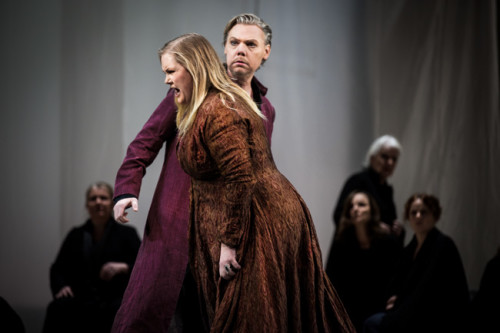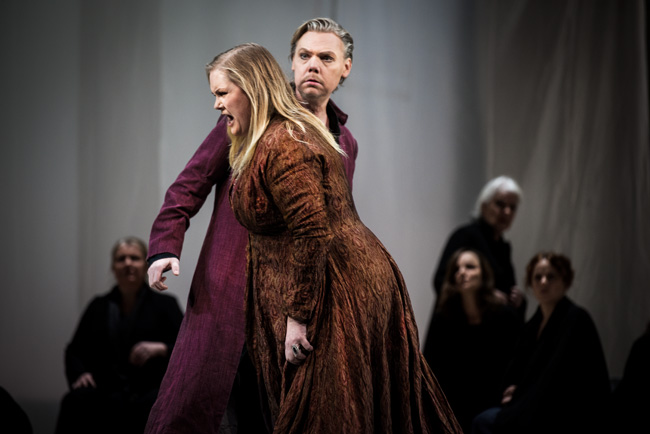 Sweden Börtz, Medea: Soloists, Female Voices from the Royal Opera Chorus and The Royal Opera Orchestra, Patrik Ringborg (conductor). Royal Stockholm Opera 29.1.2016. (GF)
Sweden Börtz, Medea: Soloists, Female Voices from the Royal Opera Chorus and The Royal Opera Orchestra, Patrik Ringborg (conductor). Royal Stockholm Opera 29.1.2016. (GF)

(c) Carl Thorborg
Börtz, Medea
This was the second performance of the work. The world premiere was on 23 January
Production:
Directed by Stefan Larsson
Sets by Rufus Didwiszus
Costumes and masks by Nina Sandström
Lighting design by Torben Lendorph
Cast:
Medea – Emma Vetter
Jason – Karl-Magnus Fredriksson
Nurse – Marianne Eklöf
Child minder – Susann Végh
King Creon – John Erik Eleby
Aigeus – Niklas Björling Rygert
Unknown young woman – Johanna Rudström
Messenger – Jonas Malmsjö
Medea´s children – David Hofvander & Casper Rosendahl
Daniel Börtz (b. 1943) has been one of the most individual voices in Swedish art music during more than four decades. He studied with Hilding Rosenberg, Karl-Birger Blomdahl and Ingvar Lidholm, three of the greatest 20th century Swedish composers. His first music-dramatic work was The Bacchae (based on Euripides like the present work) which was premiered in 1991 at the Royal Opera. This was without doubt the work that catapulted him to his position as one of the really important composers of his generation. Directed by Ingmar Bergman The Bacchae got a lot of publicity, it was televised and issued on CDs – a rarity in itself for a contemporary Scandinavian work. It was also a springboard for the young Peter Mattei. Since then Börtz has returned frequently to ancient Greek sources, including the oratorio His name was Orestes (2004) – see review of the BIS recording. In that work I noted the economic handling of the orchestra: often very sparse textures and the full orchestral outbursts reserved for the dramatic climaxes.
This is even more noticeable in Medea, where silence is a compositional means that puts the non-silent music graphically in relief. Very often the score is on a chamber music scale; long stretches of recitative or cantabile – or for that matter spoken words – are performed a cappella or with a solo instrument dialoguing with the voice. The effect is sometimes chilling – as much of the drama is anyway – but much more often it lends a deeper meaning to the singing than the vocal phrase can convey. It is as though the instrumental line expresses feelings that the character is unable to express in words.
The sets are likewise sparse and the blood-chilling scenes take place off stage, as it was in ancient Greece. What happens before our eyes is the mental conflict, the moral standpoints, the laying bare of feelings – all this requires expressive actors, and the Royal Opera has enrolled a superb cast of singing actors with Emma Vetter’s strong Medea as the hub, around whom the entire action rotates. She is formidable – not least vocally. It is a tremendous part that must be physically exhausting. Add to this the psychological challenge that this ambiguous woman constitutes and Ms Vetter’s achievement becomes even more admirable.
Karl-Magnus Fredriksson’s Jason is also an ambiguous character – truth to tell there are no uncomplicated characters in this drama – and besides his usual vocal supremacy he has through the years made ever deeper psychological portraits. This Jason is possibly his strongest role so far. And he is in good company: Marianne Eklöf’s Nurse is yet another memorable role to add to her long list of successes, Niklas Björling Rygert’s Mime in the Stockholm Ring almost a decade ago is forever etched in my retina, and he never disappoints. Susann Végh and John Erik Eleby complete the homogenous cast, where also Johanna Rudström’s young unknown woman should be mentioned. She gets the last word before curtain-fall:
And often the gods wish to raise our hopes
But nothing ever turns out as expected
For the god chooses an unknown path.
This is what happened here.
And we must not forget David Hofvander and Casper Rosendahl, who acted convincingly as Medea’s children.
There is one more important role: the Messenger, and it’s a speaking part. It was entrusted to Jonas Malmsjö, whose execution of the role was deeply intense. In the pit resided Patrik Ringborg, who is used to performing newly written operas. Less than half a year ago he conducted the world premiere of Hans Gefors’s Notorious. Ringborg has spent most of his operatic career at various opera houses in Germany, where he since 2007 is Generalmusikdirektor at Staatstheater Kassel. His precision work with the orchestra contributed greatly to the overall success of the performance.
In spite of regular statements that opera is dying, there pop up ever so often new works that contradict such statements. Daniel Börtz’s Medea is one that hopefully will stay in the repertoire for more than the premiere round. There is though all reason in the world to see it while it is on this Spring.
Göran Forsling
